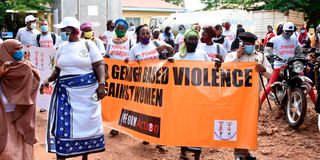Fund war on GBV, UN Women boss urges

Civil society activists mark 16 days of Activism against Gender-based Violence in Isiolo town on December 8, 2020. The United Nations Women Executive Director has called on governments to increase long-term funding and support to women’s rights organisations.
What you need to know:
- Publish What You Fund, a global organisation that campaigns for aid transparency, tracked gender financing in Kenya for three consecutive financial years from 2018/19.
- It found that while the total annual budget expanded, gender equality allocation was static at 0.3 per cent.
- In 2019/20, out of the $25 billion Budget, the national government allocated only $72 million, an increase of just $1 million from the previous fiscal year.
The United Nations Women Executive Director has called on governments to increase long-term funding and support to women’s rights organisations.
Ms Sima Bahous’ call puts a spotlight on funding gaps in the war against gender-based violence (GBV) at a time when the world is rallying behind gender justice campaigners during the 16 Days of Activism against Gender-Based Violence.
“Resources matter and the scale of financial support for this cause does not match either the scale of the issue or the statements of concern made by those in leadership roles,” she said in a statement ahead of the campaign’s launch.
Publish What You Fund, a global organisation that campaigns for aid transparency, tracked gender financing in Kenya for three consecutive financial years from 2018/19. It found that while the total annual budget expanded, gender equality allocation was static at 0.3 per cent.
For instance, in 2019/20, out of the $25 billion Budget, the national government allocated only $72 million, an increase of just $1 million from the previous fiscal year.
The 0.3 per cent is the total traceable gender equality funding for national ministries, departments and agencies (MDAs) that run gender equality programmes such as the National Gender and Equality Commission, State Department for Gender, Kenya National Commission on Human Rights and Ministry of Health (mainly reproductive and maternal health care).
Gaps
“However, many MDAs do not signpost their budget allocations as GRB (gender-responsive budgeting), nor do they say how their funds support the National Policy on Gender and Development. As a result, it is difficult to paint a comprehensive picture of government funding that supports Kenya’s gender equality commitments,” states the organisation’s 2021 report: Gender financing in Kenya: Mapping funding to improve gender equality.
Ms Bahous also called for safeguarding of the gains made so far in restoring and protecting the rights of women and girls across the world. “I ask that we all, in our own ways, resist the roll-back of women’s rights,” she said. “We can all be advocates and our voices combined can drive the change we seek.”
In the statement, the UN Women chief also appealed for strengthening of protection mechanisms for women human rights defenders and activists. “No one anywhere ever should face violence or harassment for standing up for what is right and calling for what is necessary,” she said.
Across the world, thousands of women stand up for the rights of others but they are attacked, killed, or intimidated. In Kenya two women human rights defenders have been killed and another two attacked recently.
In January, Elizabeth Ibrahim, a women’s rights advocate and land rights defender from Isiolo County was killed, allegedly by her neighbour, over a land dispute. The previous year, in July, Joannah Stutchbury, a human rights defender and environmentalist, was brutally murdered.




